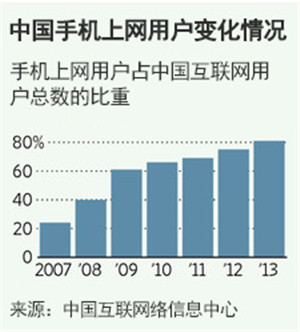(单词翻译:单击)

U.S. Internet companies like Facebook and Google live or die on mobile. The same will be true of Chinese e-commerce giant Alibaba.
对于Facebook和谷歌(Google)这样的美国互联网公司来说,生死取决于移动业务;对于中国电子商务巨头阿里巴巴集团(Alibaba Group)来说,也同样如此。
Alibaba's filing for a U.S. initial public offering boasts rapid growth and rising margins, but it raises concerns around its ability to make money off mobile traffic. This is no idle matter: Companies that can't show their business migrating well from desktops to mobile devices have justifiably fallen out of investor favor, as more people access the Internet through smartphones and tablets.
在其美国首次公开募股(IPO)申请文件中,阿里巴巴提到了公司的快速增长以及不断扩大的利润率,但是这也令外界对于该公司手机流量盈利能力的担忧升温。这种担忧并非无足轻重的问题。由于越来越多的人通过智能手机和平板电脑连入互联网,所以如果一家公司的业务无法展现出从个人电脑到移动设备的良好转变,那么这家公司将无疑失去投资者的青睐。
Alibaba says mobile accounted for 19.7% of total transactions on its e-commerce platforms in the fourth quarter of last year, up from 7.4% in the same period a year earlier. But that is only one piece of the puzzle.
阿里巴巴称,去年第四季度,移动设备在其电子商务平台总交易额中占19.7%,高于上年同期7.4%的占比。不过,这仅仅是整体情况中的一个部分。
For Amazon and eBay, mobile has been a blessing as it allows more users to shop for longer, driving volumes higher, says Bernstein analyst Carlos Kirjner. But companies that rely on advertising have faced greater challenges due to the limited real estate on smartphone screens.
Bernstein的分析师Carlos Kirjner表示,对于亚马逊公司(Amazon.com)和eBay来说,移动设备是一件好事,因为这类设备可以使得用户购物时间延长,并增加交易量。不过,由于智能手机的屏幕有限,依赖于广告的互联网企业可能面临较大挑战。
Alibaba is a mix of the two models. Tmall, its newer, higher-end shopping platform charges merchants a percentage of total sales. For this business, increased mobile adoption should be a clear positive.
阿里巴巴的业务模式则分为两种。推出时间较短、较高端的购物平台天猫(Tmall)从商户整体销售额中收取一定比例的费用。对于这一块业务,移动设备的利用程度增加应该明显是一个积极因素。
But Taobao, the site where small business and private individuals go to sell their wares, is free to use. It sells advertising space to merchants, and charges them for more prominent placement on the marketplace website. Room for both is more limited on smartphone screens, says Mr. Kirjner.
不过,针对中小型商户和个人商户的淘宝(Taobao)则是免费使用。淘宝向商户出售广告位置,同时也会帮助商户调到网站更加明显的位置并从中收费。Kirjner称,受制于智能手机屏幕,这两项服务的收入空间都较为有限。
So understanding how much revenue comes from Tmall and how much from Taobao is crucial for investors to judge the outlook on mobile monetization. Unfortunately, Alibaba neglected to share this crucial information with investors.
对于投资者来说,若想要评断阿里巴巴手机业务的盈利前景,对天猫和淘宝收入各自占比多少有所了解具有至关重要的作用。但是不幸的是,阿里巴巴并没有将这一关键信息分享给投资者。
Alibaba does say it expects monetization rates to be lower on mobile as compared with PCs. But the company seems unconcerned, explicitly stating that it has no plans for now to focus on maximizing mobile monetization. Throughout the prospectus Alibaba is at pains to stress a lack of focus on short-term profits, probably enabled by a corporate structure giving insiders control over most of the board.
不过阿里巴巴表示,预计移动设备上的盈利水平低于个人电脑。但是阿里巴巴似乎并不担心这个问题,公司明确表示目前没有专注于将移动设备盈利水平最大化的计划。在整个招股书中,阿里巴巴花费了大量力气强调对于短期利润关注的缺乏,导致这种情况出现的原因可能在于董事会主要由其内部人士掌控。
Investors may not be so sanguine. Concern over mobile monetization was one factor that drove down Facebook shares after they listed in 2012. The stock rebounded sharply once Facebook was able to show traction in mobile, notably from the second quarter of 2013 when mobile advertising jumped as a percentage of total ad revenue.
投资者可能没有这么乐观。Facebook 2012年上市后,投资者对该公司移动业务业绩的担忧就是导致其股价下跌的因素之一。Facebook的移动业务随后显示出了增长迹象,尤其是在2013年第二季度,在该公司移动业务广告收入占广告总收入的比重上升之后,Facebook的股价出现了大幅反弹。
In China, mobile is likely to be even more important as many new Internet users skip desktops and rely mainly on smartphones. The number of mobile Internet users in China rose 19% last year to 500 million, nearly twice as fast as overall Internet users, according to according to state research center CNNIC.
在中国,不少互联网新用户已不再使用台式电脑,而主要用智能手机上网,因此移动业务在中国可能会变得更加重要。来自中国互联网信息中心(CNNIC)的数据显示,去年中国的移动互联网用户数量增长19%,达到5亿户,增幅较整体互联网用户增幅高出近一倍。
Mobile is also where Alibaba will encounter the fiercest competition,notably from archrival Tencent. This diversified Internet giant has the advantage in mobile thanks to WeChat, a massively popular messaging app that is native to smartphones.
移动业务也将是阿里巴巴面临最激烈竞争的领域,尤其是来自腾讯(Tencent)的竞争。腾讯推出的基于智能手机的通讯应用微信(WeChat)大受欢迎,令这家多元化互联网巨头在移动领域占得先机。
Tencent is now using WeChat to direct potential shoppers to JD.com, a smaller Chinese e-commerce company, also preparing for a U.S. listing, in which it holds a 15% stake. It is also integrating its payment platform Tenpay, which competes with Alibaba-linked Alipay, into WeChat.
腾讯目前正在通过微信将潜在消费者导向规模较小的中资电子商务公司京东(JD.com)的网站,京东也正准备在美国上市,腾讯持有该公司15%的股权。腾讯还计划将支付平台财付通(Tenpay)与微信整合在一起。财付通是阿里巴巴旗下支付宝(Alipay)的竞争对手。
Alibaba isn't sitting on its hands. It has amassed a 66% stake in UCWeb, a popular mobile Web browser, and recently struck a deal to take full control of mapping service AutoNavi. Alibaba says it will likely make more acquisitions in this area. Yet these investments, plus intense competition in the mobile space, may start to eat away at Alibaba's sky-high operating margins, which were north of 50% in the fourth quarter.
阿里巴巴并没有坐以待毙。该公司已收购热门移动浏览器UCWeb 66%的股份,近期还达成了收购地图服务公司高德软件(AutoNavi)全部股权的交易。阿里巴巴表示,可能将在移动领域收购更多资产。但这些投资,再加上移动领域的激烈竞争,可能会开始侵蚀阿里巴巴水平极高的营业利润率,该公司去年第四季度的营业利润率超过50%。
Given the importance of mobile, investors may forgive Alibaba for some heavy spending. But the experience of Facebook and others indicates Alibaba will need to show before long that it is translating eyeballs on smartphones into real money.
考虑到移动业务的重要性,投资者可能会理解阿里巴巴的一些大规模支出。但Facebook和其他一些公司的经历表明,阿里巴巴不久就需要向投资者显示,该公司能将消费者对其移动业务的关注转化成真金白银的利润。


